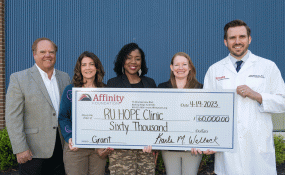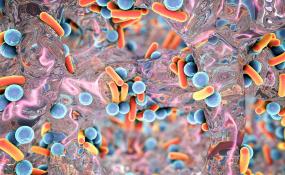Why is CAR T-cell Therapy So Exciting? Answers From an Expert
CAR T-cell immunotherapy is a treatment in which a patient's T-cells are genetically reprogrammed to find and kill cancer cells. Currently, CAR T-cell therapy products are used for patients with adult aggressive B-cell non-Hodgkin lymphoma or acute lymphoblastic leukemia in children or young adults who have already been through two standard treatments. When the Food and Drug Administration (FDA) approved this type of therapy, experts deemed it revolutionary, and a new era in the treatment of cancer.
Ira Braunschweig, MD, chief of Transplant and Cell Therapy at Rutgers Cancer Institute of New Jersey, the state’s leading cancer center and only National Cancer Institute-Designated Comprehensive Cancer Center, chief of the Transplant and Cell Therapy Service of the RWJBarnabas Health Oncology Service Line, and director of Cell Therapy and Bone Marrow Transplantation at Robert Wood Johnson University Hospital, an RWJBarnabas facility, explains why this type of therapy is one of the most significant breakthroughs in cancer treatment.
Why is CAR T-cell therapy so exciting?
First and foremost, simply because it is curing many patients with hematologic malignancies that only a few years ago would have succumbed to their disease. The fact that this is a realization of decades of cancer immunology research also makes it particularly gratifying to be able to offer this treatment to patients.
How is immunotherapy different from chemotherapy?
Chemotherapy kills cancer cells which rapidly divide but it also exerts toxic effects on normal cells. In CAR-T immunotherapy, a patient’s own immune cells are re-engineered to be able to specifically target the patient’s cancer cells. Itis the ultimate in personalized and targeted cancer therapy.
What distinguishes Rutgers Cancer Institute of New Jersey and RWJBarnabas Health as a destination for CAR T-
cell therapy?
Our program is led by experts who have been at the forefront of this therapy and actually did some of the studies which established this therapy as the standard of care for relapsed and refractory lymphoma, so our experience and expertise is second to none in the U.S. We also have the full array of CAR-T products so we can tailor the best CAR-T for a given patient. Our infrastructure also allows us to provide CAR-T cell therapy as an outpatient when it makes sense for the patient, or as an inpatient when needed.
Is this just the beginning of what’s to come with CAR T-cell therapy?
Yes, it is just the beginning. We will soon have clinical trials for new indications in the hematologic malignancies, as well as CAR-T clinical trials for solid tumors such as lung cancer and pancreatic cancer which are direly needed, so stay tuned.
Media contact:
Krista Didzbalis




